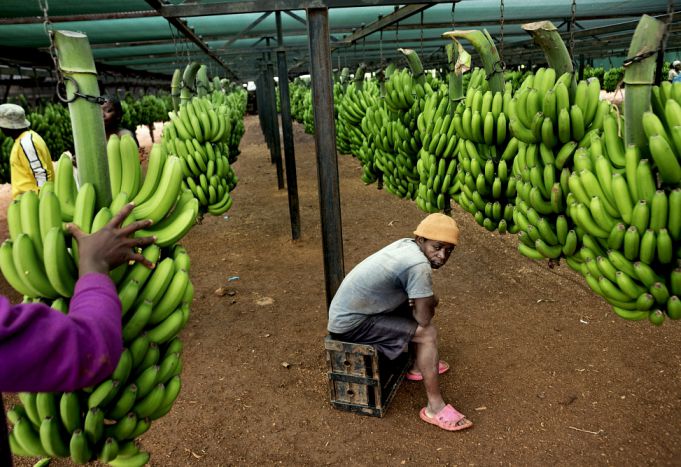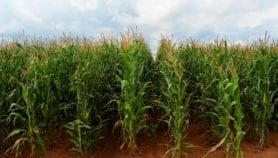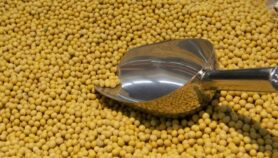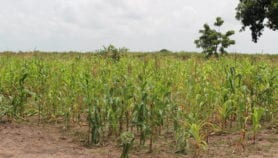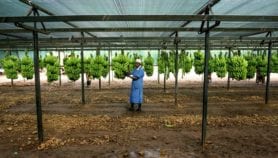By: Adole Abutu
Send to a friend
The details you provide on this page will not be used to send unsolicited email, and will not be sold to a 3rd party. See privacy policy.
After several years of intense debate and setbacks, Nigeria’s Senate eventually passed the National Biosafety Agency Bill into law on 26 February 2015. [1] The then President Goodluck Jonathan assented to it on 20 April 2015 as one of his last official duties before handing over to the new President Muhamadu Buhari on 29 May 2015.
Rufus Ebegba, an agriculturist and environmental biologist who has over the last 25 years been involved in biosafety management, biodiversity conservation and sustainable use of renewable natural resources, was in April 2015 appointed the director-general of the Nigeria Biosafety Management Agency (NBMA) by the then President Jonathan.
In this interview, Ebegba speaks to SciDev.Net on the preparedness of his agency to regulate the application of modern biotechnology and the use of genetically modified organisms (GMOs) in Nigeria despite existing challenges.
Nigeria passed the biosafety law last year after three attempts. Of what significance is this legislation to the country?
With the adoption of National Biosafety Management Agency Act 2015, Nigeria has now domesticated the Cartagena Protocol on Biosafety, which the country signed in 2000 and ratified in 2003. It therefore means that Nigeria is now a player in global biosafety regulation. It also now opens avenues for Nigeria to adopt modern biotechnology legally for economic development.
“It also now opens avenues for Nigeria to adopt modern biotechnology legally for economic development.”
Rufus Ebegba, Nigeria Biosafety Management Agency (NBMA
We are also providing assurance of adequate regulated use of modern biotechnology for increased productivity in the agricultural sector that would lead to improved socio-economic development of Nigerian farmers and enhanced national economic prosperity. It will also attract foreign investments and earnings from a safe modern biotechnology sector, leading to environmental sustainability, jobs or wealth creation and the availability of raw materials for industrial growth, particularly in the Nigerian textile sector.
The development of plants or organisms that can reduce the impact of climate change and serve in pollution remediation and improve the health sector using various plants that abound in the country are other areas that the application of modern biotechnology would be of use. We are prepared to provide the conducive environment for such uses to happen.
Given that modern biotechnology remains a controversial subject, how well is NBMA prepared to deal with such a challenge?
The NBMA is a well-prepared organisation. It currently has personnel who have been trained within and outside Nigeria in biosafety regulation and enforcement. We have national biosafety guidelines and regulations developed as well as the National Biosafety Laboratory for analysing GMOs. The NMBA has also liaised with other government agencies having mandates relating to the use or otherwise of biotechnology and we are also in constant discussions with prospective clients and key players. We are not promoters of biotechnology, but regulators to ensure that its use does not in any way jeopardise the health of Nigerians or the environment. The controversial nature of biotechnology makes it imperative for the NBMA to be on the ground to monitor and above all to ensure that biotechnology is deployed in the country in such a way that it is devoid of risk.
What is the major task facing Nigeria’s NBMA as a young regulator and enforcer of biosafety?
We were created the very moment the president assented to the bill. Before this time, we had operated as a unit in the Federal Ministry of Environment. The chief executive officer of the agency has been appointed, other personnel are also on ground, biosafety applications are already being received and we have started vital operations, including the documentation of GMO suspects in the country. It is important to note that we have been operating as a department in the Federal Ministry of Environment by providing guidance to institutions that were undertaking GMO research in the country. In the last five years, research projects into GMO cowpea and cassava have been continuing in universities and in research institutes while that of rice is starting.
“Research institutes or organisations now have a basis to carry out overt modern biotechnology research and development for product deployment.”
Rufus Ebegba, Nigeria Biosafety Management Agency (NBMA)
Does Nigeria have capacity to deal with underlying sensitive issues such as GMOs development?
Yes. Some Nigerian institutions such as the Institute for Agricultural Research at the Ahmadu Bello University, Zaria and the National Root Crop Research Institute, Umudike have partnerships with some foreign institutions in GMOs development and are currently carrying out confined field trials of GMOs. Some institutions such as the Sheda Science and Technology Complex and the National Cereals Research Institute, Badeggi have also acquired modern biotechnology competence, and the NBMA has accredited them to carry out modern biotechnology activities. Research institutes or organisations now have a basis to carry out overt modern biotechnology research and development for product deployment. This was hitherto not possible due to the absence of the law, but since the passage of the law and the establishment of NBMA, we are exploring all possible collaboration that would ensure that the technology contributes to Nigeria’s quest for self-sufficiency in food production, job creation and poverty alleviation in a safe manner.
What is the importance of the continuing nationwide survey of GMOs organisations and activities that you started conducting in 2015?
The survey is a basis for us to ascertain our current GMO and modern biotechnology activities, document them and be sure that these are the GM products that we need. We will also require operators in this sector to formalise their dealings in modern biotechnology and GMOs. As a government agency we are entitled to government subvention and as a regulatory agency we are mandated by law to charge fees for some of the services we are going to be providing. There are also permit fees that clients will be paying. We shall also be undertaking capacity building programmes for institutions and organisations and some fees would be paid by them as means of revenue generation. Proposals for funding would also be developed. So with these sources of funding, we hope to run the agency effectively and efficiently.
What lessons can the NBMA offer other African countries?
It is important for GMO research and development to be conducted under a legally regulated framework and to also provide the necessary boost to the scientists and researchers who now know that their research would go beyond the shelves in universities. The NBMA has established a laboratory to ascertain the composition of GMOs when we have doubt, and also for training the agency’s employees in GMOs analysis and for GMOs detection.
Because the operationalisation of the new law was almost immediate of its assent, unlike in some African countries such as Tanzania and Uganda where it has taken long before operationalisation, our regulatory regime encourages safe practice of modern biotechnology.Capacity building commenced many years before the bill was passed into law and there was the wide involvement of key players in biosafety development in Nigeria.
Q&As are edited for length and clarity.
This piece was produced by SciDev.Net’s Sub-Saharan Africa English desk.


